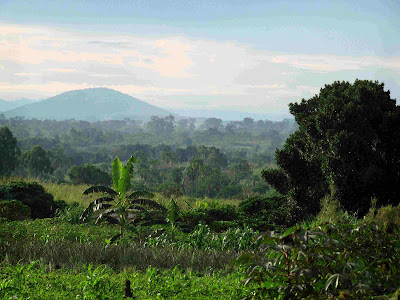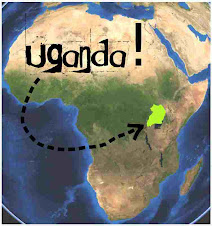So, what's it like teaching science in rural sub-Saharan Africa, you ask?
Well, for one, teaching a class of over 100 students with marginal command of the English language is a whole different ballgame from tutoring a single, native English speaker (my job prior to joining the Peace Corps). Tutoring facilitates learning through continuous student-tutor dialogue: the student communicates gaps in knowledge or ability to the tutor either directly (by asking a question) or indirectly (by failing to do a math problem correctly, e.g.), and the tutor responds accordingly. Each student is different, and it is the responsibility of the tutor to adapt his teaching methods to the learning style of the individual so that understanding is achieved. However, when you teach a class of 100+ students, this kind of learning dynamic is completely and utterly infeasible. How can you adapt to the learning styles of 100 individuals when you don't even know their names?
The answer is that you can't. The best you can realistically do is aim for decent average comprehension by planning each lesson thoroughly and presenting it clearly and logically. I walk into class with the expectation that not everyone is going to understand everything I say, but at the very least they'll have a clear set of notes to study from by the time I'm done teaching. These kids don't have textbooks; what they copy from the blackboard is the only reference text they're ever gonna get. The unfortunate reality is that the majority of a class period is spent copying notes from the board. There's simply no other way to ensure that students have written study material. Kiziranfumbi Secondary has no money for printing or photocopying notes (it's a public school in the Third World, after all), and Ugandan students aren't used to taking notes on what a teacher says (they have enough problems understanding my English anyway), only on what's written out for them, quite literally in black and white.
As you can imagine, this is really frustrating! If I spoon-feed notes to the class for 80 minutes, the learners get bored and fall asleep. If I opt to do fun demonstrations, walk around, and lecture informally instead, class might be more entertaining, but nobody takes notes and therefore nobody can study. Finding a balance between these extremes is tough. This is especially true with teaching mathematics, which is harder to find good, non-time-wasting demonstrations for.
It doesn't help that the education system in Uganda appears, for all intents and purposes, to be dead-set on draining every last ounce of creative thought and critical thinking out of the students it is supposed to be educating. The Uganda National Examinations Board (UNEB) sets yearly exams for fourth-year secondary school students that test material covered across all subjects, throughout all four years. Teaching is geared entirely towards getting students to pass the UNEB exams. Think about it: how shitty would your high school education have been if every class you sat through was SAT prep? Not that teachers here spend every class period working through multiple-choice problems, but the emphasis on rote memorization of inane facts for the purpose of passing the exams is omnipresent. In the grand scheme of things, it is far more important that a student be able to apply knowledge than regurgitate it. But these exams test regurgitation, and if a student does not pass a certain number of them, he or she cannot continue on to the fifth and sixth years of secondary school ("A'level, or "Advanced Level"). And if you don't complete those years, you don't get to go to university, or a teacher's college, or really do anything substantial with your life! Okay, perhaps that last one is an overstatement, but if you came to my village and saw how many people spend the entirety of every day sitting around doing nothing, idly awaiting a customer that never comes, or just drinking themselves into a stupor, you might conclude that I'm not far off base here.
And so I find myself in a very odd position of having to spice things up and encourage critical thought, while simultaneously teaching towards the exams, knowing full well how monumentally important they are to determining one's outcome in life. I haven't graded enough of my students' work to see how effective I've been, but at least the bar is set low: 30% is considered a passing grade. Perhaps that's because midterm and final exams are the only work that count towards grades, and there aren't resources for going around printing practice tests.
A note on the textbooks I've been issued for lesson planning: uuuuuurrrrrrnnnggghhh. I quote the preface to O. Akonopeesa & R. Oriada's Physics: A Complete Course: "Physics has always been considered a nightmare subject by many students. However, in this era of rapid scientific advancement physics becomes unavoidable." Great job, guys. In the first two sentences of your book, you've validated students' fear of physics by labeling it "a nightmare subject," then characterized it as a kind of necessary evil by calling it "unavoidable." I'm almost happy there aren't enough copies of your book to go around. It would make my job miserable if my students shared your negative attitude towards the very subject you "taught for a long time in Kenya and Uganda." Never mind the fact that your 2002 text is a blatant, shameless, and shoddy repackaging of A.F. Abbott's Physics, copyright 1963 (the other book I use for teaching my second year physics course). Forty years is a long friggin' time "in this era of rapid scientific advancement." Did you even bother to check if anything's changed since then? Apparently not, judging by your description of how solar power is generated: "Large concave mirrors collect the sun's rays and focus them onto special steam boilers which provide the mechanical force to run electric generators." Take a look at the solar panels on a calculator. Do you see large concave mirrors? How about steam boilers or rotating electric generators? If that Postgraduate Diploma in Radiation Physics from the University of Witwatersrand in South Africa is worth as much as the paper it was printed on, you'd know that conventional solar power is generated by light exciting electrons into the conduction band of a semiconductor. I suggest you boys find a new line of work. That or hire a damn copy-editor.
Am I done enumerating my teaching woes and grilling the textbook authors that exacerbate them? Yes. I do really enjoy teaching, even though it makes me tear my hair out sometimes. It helps that the school has a nice little library to relax in after class, and flip through books on African geography or Old English epic poems (let me tell you, they're pretty epic). My physics class tells me I speak clearer and teach better than any physics teacher they've had, which of course makes me happy. Students often come by my house to say hi, give me some fruit, or watch a movie. I get along very well with the other teachers at Kiziranfumbi SS, too. We chit-chat and play hyper-competitive games of Scrabble, and go out for drinks at night. Tomorrow I'm attending a celebration of the anniversary of the King of Bunyoro's coronation with some of them. I may even meet the king, who knows? I think he's a neighbor of the headmaster.
Other news:
I've started clearing land for a personal garden at the south end of the school compound. This involves slashing and burning the overgrown area used by the Volunteer previously stationed here (before he got kidney stones, was medevac'd to South Africa twice for treatment, then finally sent back to the States by Peace Corps - rumor has it the gardening was somehow responsible). Slashing is done by hand with a machete-like "slasher," and is even better exercise than using a mechanical push mower! My shredded, blistered palms can attest to the quality of these tools. Carrots, red onions, peas, lettuce, coriander, sweet basil, and possibly watermelon are going in the ground next month, when the rains return.
I had a kitten for about a week. We found her in the school office, and even though she was feral, I decided to take her home. No joke, that first night I had her licking warm milk off of my fingers (girls, that's your cue to say, "Awwwwwwww"). She wouldn't drink it any other way. Unfortunately, my neighbors were afraid of her and after she vomited rancid milk into my bedsheets, I decided it was time for Kayaga ("Little Storm") to go.
I shaved my head. This came on the heels of a disastrous haircut from a local barber who, believe it or not, did not own a pair of scissors. The typical African buzz-cut look didn't work for me, so I decided to start from scratch. I'll post pictures when I get a chance, including the ones of the mohawk I had for about 5 minutes. In Uganda, the shaved head look is called the "Shao-Lin." Previously, when I wore my long hair up in a bandanna tied like a headband, kids asked me if I was Bruce Lee.
A new discotheque called The Afro-land Joint opened up in Kiziranfumbi. It's owned by a local who goes by Best Man. Must be a pretty cool guy, with those neon lights lining his SUV runningboards and all. Kiziranfumbi lies on a major road to Lake Albert, where oil has recently been discovered, so lots of development is happening around here. It's exciting to have village nightlife. Hopefully Best Man will let me mix some foreign dance tracks in with the domestic reggaeton.
This song is stuck in my head:
Ability by Radio & Weasel. It's some of the only Ugandan music I like. The words you don't understand are in Luganda, the language of Buganda, the largest kingdom in Uganda.
That's enough for now. Peace out. I've got a tribal king to meet.






















































